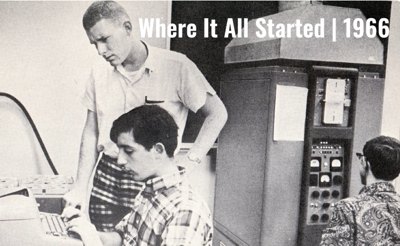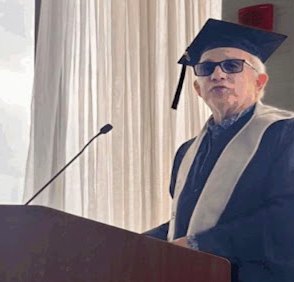| Mitch Kapor Gains MSc 45 Years After Dropping Out of MIT |
| Written by Janet Swift | |||
| Friday, 04 July 2025 | |||
|
Mitch Kapor, founder of Lotus Development Corporation and designer of Lotus 1-2-3, the "killer application" which made the personal computer ubiquitous in the business world in the 1980s has completed his MSc from MIT's Sloan School of Management, started in 1979. Last year Mitch Kapor was invited by Bill Aulet Professor of the Practice at the MIT Sloan School of Management to deliver the 2025 Doriot Lecture. This is an annual event that honors General Georges F. Doriot, who founded the first publicly owned venture capital firm and taught at Harvard Business School. The lecture covers topics related to venture creation, innovation, and venture capital, making Kapor, a pioneer in the personal computing industry and long-time startup investor, the ideal speaker. During the phone call, however, Aulet joked about a potential problem - Kapor had never finished the MSc in Managment Studies, the precursor to an MBA, he had enrolled in at MIT. It may have been intended as a joke, but for Kapor, who had interrupted his studies at MIT when lured by a $20,000 contract for VisiPlot and VisiTrend it was an unfinished project he wanted to complete. Not many people go back to school in their seventies and in fact Kapor didn't have to. Instead he submitted a thesis on "Impact Investing" with Aulet as his thesis advisor and was awarded his degree at a ceremony on May 29, 2025. Mitch Kapor is a perfect example of someone whose destiny was shaped by early exposure to computers and to computer software, but his story has some interesting digressions that I only learned about through another lecture, one given in January 2025 at the University of San Francisco with the title "50+ Years of Disruptive Innovation": Kapor tell us that he wants to: "share some reflections on my own journey, what things were like back in the Paleolithic era of computing when this was all getting started" The first slide shows him in 1966: I'm at high school, I'm 15 years old, and this is my first exposure to computers. So I'm sitting at a keyboard. The computer is the thing that looks like the oil burner to the right of, uh, with the meters on it. And it's a first generation Bendix G15 tube computer with roughly one billionth the computing power of what I have on my wrist. And this was at a National Science Foundation-sponsored summer program for gifted and talented youth. The US was trying to catch up with the Russians, who had launched Sputnik a few years before in the space race. They were out there first, and part of what the US government was doing was funding programs for bright high school students to stimulate their interest in math and science. And so I was fortunate to be in this program, and it was a life-changing experience because I had access to computing, and I knew that that was something I wanted to do with my life. Kapor then tells us about a "detour": And then the counterculture happened ... I was off at college, uh, and I wound up majoring, I like to say, in recreational chemistry. I actually spent most of my time in college at the college radio station where I was a disc jockey ... my first professional job, was at a radio station in Hartford, Connecticut, uh, playing classic rock before it was classic rock. In the '70s, I was sort of a wandering, lost soul. After college, did not know what to do with myself. Along the way picked up a master's degree in counseling psychology, and in fact, I was working in the psychiatric unit of a community hospital as a mental health worker and I was also, at night, experimenting with doing stand-up comedy. He had also gained a BA from Yale College in 1971 and studied psychology, linguistics, and computer science as part of an interdisciplinary major in Cybernetics. The next major event in his own words were: "the Apple II happened to me" Buying one involved journeying into New Hampshire where there was no sales tax but Kapor put it to use with immediate effect as recounted in the lecture: The day after I bought this thing, I was hanging out in a computer store and observed a well-dressed gentleman in his 40s purchasing an Apple II.I was just eavesdropping on the conversation, and he was an ophthalmologist. He said he had some ideas about incorporating it into his practice, but I could kind of tell he didn't really know much about what he was doing. I went up to him as if possessed by some spirit that had temporarily inhabited my body and said, "Sir, I'm a consultant, and I think I can help you with your problem." I was not, in fact, a consultant. I had never done anything like that. I did have, from high school and a little bit from college, some basic computer skills, and I'd had my Apple II for one day. I figured that was a day longer than him, and if I could just stay ahead of him... and he actually hired me. That was how I got started in personal computers, at I think $7 an hour, which even in 1978, was not a lot of money. From this point in the lecture Kapor goes into things I already knew and which are detailed in our history article, Mitch Kapor and Lotus 1-2-3. He talks about Dan Bricklin and VisiCalc, the original spreadsheet for which he wrote the VisiPlot and VisiTrend extensions and then about how he and Jonathan Sachs founded Lotus Development Corporation in 1982. Referring to its flagship product Lotus 1-2-3 as: "The killer app that really drove the adoption of PCs in the business world in the 1980s" Kapor notes: "The sobering thing about it for me is if you were say, born after 2000, hello, you've never heard of this because it is ancient history. It is like the Assyrian or Babylonian Empire, replaced successively by, you know, conquering armies. 1-2-3 had its day in the '80s and into the '90s, and then Microsoft had Windows, and they put Excel in that, and that was a triumph in the '90s and into the 2000s. Summing up the episode in his life, Kapor states: Lotus was a fabulous ride while while it lasted, I learned a number of things - one was that I really didn't want to be the CEO of a big company.
The lecture then moves on to the work of the Kapor Center which he founded 2000 as an institution focused on tech inclusion and social impact and Kapor Capital is its venture capital arm. This has operated since 2011 and adheres to a pledge to only invest in companies that prioritize diversity and to focus on products that "close gaps of access and opportunity". It is these ideals that are outlined in his MSc thesis under the title "Principles and Practices of Gap-Closing Investing". More InformationMitch Kapor Finally Got His MIT Degree Related ArticlesLotus 1-2-3 Launched 30 Years Ago Today Dan Bricklin - Inventor of the PC Spreadsheet To be informed about new articles on I Programmer, sign up for our weekly newsletter, subscribe to the RSS feed and follow us on Facebook or Linkedin.
Comments
or email your comment to: comments@i-programmer.info
|
|||
| Last Updated ( Friday, 04 July 2025 ) |




